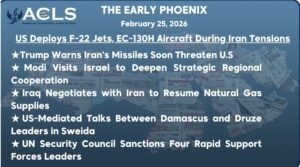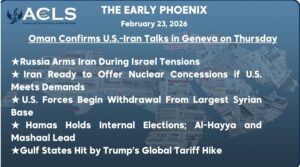Top Headlines:
- Iran Holds Presidential Elections Under Controversy and Boycotts
- Nasrallah Says Resistance Front’s Fate Depends on Iran’s Future
- US Unfreezes Shipment of 500-Pound Bombs to Israel
- UN Security Council Condemns Houthi Attacks on International Shipping
- Baghdad Denies Plans to Host Hamas Leaders
=======================
★ IRAN
-
Iran Holds Presidential Elections Under Controversy and Boycott Calls
Iran’s 14th presidential election commenced on Friday, featuring candidates Saeed Jalili, Mohammad Baqer Qalibaf, Mostafa Pourmohammadi, and Masoud Pezeshkian. Jalili, Qalibaf, and Pourmohammadi represent the fundamentalist faction, while Pezeshkian is backed by reformists. Despite speculation, Jalili and Qalibaf did not withdraw in favor of one another, maintaining a four-candidate race. Voting is held at 59,000 polling stations across 95 countries, with 15,000 mobile stations enhancing accessibility. As voters participate, a significant debate persists about the election’s legitimacy. Pro-boycott advocates argue participation legitimizes a rigged system, while supporters claim voting, particularly for Pezeshkian, offers a small chance for reform. Supreme Leader Ali Khamenei urged high turnout despite widespread boycotts from various groups. Turnout is expected to range between 50% and 55% of the nearly 61 million eligible voters. Political and civil groups, including the United Youth of Iran and the Taheri Movement, continue to push for a boycott, citing ongoing human rights violations and lack of meaningful reform.
-
US Imposes New Sanctions on Iran Over Nuclear Escalations
After recent reports indicate Iran could soon produce enough weapons-grade uranium for five nuclear weapons, intensifying international concerns, the US announced new sanctions on Iran for its nuclear advancements and lack of cooperation with the UN’s nuclear watchdog, targeting three UAE-based companies and 11 associated vessels. The G7 has also warned Iran against advancing its nuclear activities.
=======================
★ ISRAEL-HEZBOLLAH CRISIS
-
Nasrallah Says Resistance Front’s Fate Depends on Iran’s Future
Lebanon’s Hezbollah Secretary General Hassan Nasrallah stated that the future of the “Resistance Front” depends on its main sponsor, Iran. Speaking at a ceremony commemorating the 40th day since the death of Iran’s President Ebrahim Raisi, Nasrallah emphasized that Iran influences the path and fate of regional nations and the Resistance. He urged the Iranian people to elect the right president in the upcoming election, highlighting that Iran’s policies towards supporting regional militant groups like Hezbollah, Hamas, Palestinian Islamic Jihad, Houthis, and Iraqi Shiite militias will remain unchanged regardless of the presidential outcome. Nasrallah hinted at possible attacks on Cyprus and emphasized the group’s readiness with 100,000 fighters. He claimed that if Israel uses Cypriot bases, Hezbollah would target them. Despite Hezbollah’s aggressive stance, the group faces internal challenges, including significant intelligence infiltration and losses of key figures.
-
Israeli Strike Kills Hezbollah Member in West Bekaa
An Israeli drone strike killed Hezbollah member Ali Ahmad Alaeddine in West Bekaa, Lebanon. Alaeddine was involved in firing explosive drones into Israel. Hezbollah confirmed his death and announced his funeral for Friday. Israeli strikes in Lebanon have killed over 400 people, including militants and civilians, while strikes from Lebanon have resulted in 16 Israeli soldier and 11 civilian deaths. Hezbollah vows to continue fighting until Israel halts its Gaza offensive.
-
Hezbollah Fires 40 Rockets at Northern Israel Following IDF Drone Strike
Hezbollah launched 40 rockets at northern Israel after an IDF drone strike killed a Hezbollah operative. American intelligence anticipates a potential war between Israel and Hezbollah if a Gaza ceasefire isn’t reached soon. Most rockets were intercepted by Israel’s Iron Dome. The attack, claimed by Hezbollah, was in response to recent Israeli strikes that killed several operatives. Israel responded with airstrikes and artillery.
-
Israeli Airstrikes Devastate Lebanese Village of Aita al-Shaab
Satellite images reveal significant destruction in the Lebanese village of Aita al-Shaab, caused by months of Israeli airstrikes. The conflict, the worst in 18 years between Israel and Hezbollah, has damaged numerous buildings and displaced tens of thousands. Israeli strikes have killed over 300 Hezbollah fighters and 87 civilians, while fire from Lebanon has resulted in 28 Israeli deaths.
=======================
★ ISRAEL & PALESTINIAN TERRITORIES
-
US to Release Suspended Shipment of 500-Pound Bombs to Israel
The Biden administration will release 500-pound bombs to Israel, previously suspended last month. Discussions during Israeli Defense Minister Yoav Gallant’s visit to Washington revealed plans to deliver these bombs, with further review ongoing for 1,800 and 2,000-pound bombs. The suspension was initially due to concerns about their impact on densely populated Gaza areas. Israeli Prime Minister Netanyahu recently criticized the Biden administration for delays in weapons delivery, which American officials denied, emphasizing that support has been substantial. Since the Gaza conflict began, the US has provided over $6.5 billion in military aid to Israel.
-
IDF Controls 70% of Rafah, Reports 550 Hamas Fighters Killed
The Israel Defense Forces (IDF) announced it now controls 70% of Rafah in southern Gaza. Hamas has shifted from hierarchical combat to guerrilla tactics. The IDF reports killing 550 Hamas fighters during its Rafah operation, with many others fleeing north. Despite efforts to re-establish control, Hamas struggles due to disrupted communication and significant losses. The IDF faces challenges due to extensive ammunition, explosives, and tunnel networks. The operation’s pace is slow, with an estimated 6 to 24 months needed to eliminate Hamas in Rafah.
-
Security Cabinet Approves 5 West Bank Outposts and Sanctions PA Officials
Israel’s security cabinet approved legalizing five West Bank outposts and imposing sanctions on Palestinian Authority (PA) officials. Finance Minister Bezalel Smotrich confirmed the measures, including withholding PA tax funds and extending a waiver for Palestinian banks to operate with Israel. The sanctions respond to PA actions in international courts and UN initiatives. The outposts include Evyatar, Sde Efraim, Givat Asaf, Heletz, and Adorayim. Settler leaders praised the decision, while Peace Now criticized it for harming US relations and prioritizing settler interests over national needs.
-
Jordan Tries Suspected Weapon Smugglers to West Bank
Jordan’s State Security Court is prosecuting three citizens accused of attempting to smuggle weapons to the northern West Bank through the Jordan Valley. The defendants, Ibrahim Jaber, Huthaifa Jaber, and Khaled Al-Majdalawi, reportedly viewed their actions as a religious and national duty. This trial follows intensified Jordanian efforts to thwart arms trafficking from Iran through southern Syria and into the region, allegedly orchestrated by terrorist groups. The recent discovery of explosives in an Amman warehouse, linked to an Iranian conspiracy, demonstrates the ongoing security challenges.
-
IAF Intensifies Drills for Potential Iran Strike
The Israeli Air Force (IAF) has ramped up extensive training exercises simulating long-range strikes, potentially in preparation for action against Iran. These drills reflect growing concerns within the Israeli security echelon that Iran is exploiting Israel’s current focus on conflicts in Gaza and Lebanon to advance its nuclear program. Recent intelligence suggests Tehran is making significant progress towards military nuclear capability. In response, the IAF has increased its readiness, incorporating long-distance flights and refueling operations.
-
Netanyahu Warns Iran Seeks Regional Domination
Prime Minister Benjamin Netanyahu informed visiting former US military officials that Iran aims to overthrow Middle Eastern regimes, including Jordan and Saudi Arabia, and emphasized that defeating Hamas is essential to thwarting these ambitions. Speaking in Tel Aviv, Netanyahu described Iran’s strategy as a coordinated ground and missile offensive, which Israel has the opportunity to disrupt. He highlighted Iran’s broader plan to dominate the Middle East and eventually target Europe and the United States.
=======================
★ YEMEN
-
WBIED Attack on Seajoy in Red Sea, Crew Safe
A Greek-owned, Malta-flagged bulk carrier, Seajoy, was attacked by a waterborne improvised explosive device (WBIED) in the Red Sea on June 27, 2024, as reported by British security firm Ambrey and UK Maritime Trade Operations (UKMTO). The attack occurred at 0645 GMT, 84 nautical miles west of Yemen’s port of Hodeidah. Despite the attack, all crew members were reported safe, and no damage was sustained by the vessel. The Seajoy, en route to Dammam, Saudi Arabia, continued its voyage without further incident.
-
Houthis and Iraqi Forces Strike Haifa Port
Yemen’s Armed Forces and Iraq’s Islamic Resistance launched a coordinated attack on Israel’s Haifa port and vessels bound for Israeli territories. Utilizing cruise missiles, drones, and naval forces. Yemen’s military spokesman, Yahya Saree, claimed successful hits, including a “hypersonic ballistic missile,” marking a significant escalation in the regional tensions.
-
UN Security Council Condemns Houthi Attacks on International Shipping
The UN Security Council passed Resolution No. 2739, condemning Houthi attacks on international shipping in the Red Sea, Arabian Sea, Gulf of Aden, and Indian Ocean. The resolution, supported by 12 of 15 members with Algeria, China, and Russia abstaining, demands the immediate cessation of attacks and the release of the detained ship “Galaxy Leader” and its crew. It calls for member states to prevent the supply of weapons to the Houthis. Reports indicate Saudi Arabia sought China’s mediation to halt Houthi attacks, with Saudi Defense Minister Khaled bin Abdulaziz bin Salman Al Saud visiting Beijing for discussions. A commercial ship heading to Saudi Arabia was attacked by the Houthi militia in the Red Sea. The British maritime security company Ambrey reported that the vessel was hit by a projectile 84 nautical miles west of Yemen’s Hodeidah port. There have been no reports of injuries or damage. The ship, destined for Dammam in eastern Saudi Arabia, continues its journey. The British Maritime Trade Operations Authority confirmed the incident, noting the attack involved a seaborne improvised explosive device, but the ship and crew remain safe.
-
Houthi Leader Reveals New Weapons in Maritime Attacks
Houthi leader Abdul-Malik al-Houthi announced the deployment of new weapons, including ballistic and winged missiles and a destructive Tufan boat, in attacks against international shipping. He highlighted the economic impacts on America and Britain due to these operations. Al-Houthi also claimed responsibility for joint operations with Iraqi resistance groups and warned of potential attacks on new US aircraft carriers entering the Red Sea. On Thursday, the Houthi group claimed responsibility for attacks on Israel’s Haifa port and a commercial ship in the Red Sea. The group, in collaboration with Iraqi factions, used a manned boat, missiles, and drones for the operations. The British maritime security company Ambrey confirmed a commercial ship was struck by a projectile off Yemen’s coast.
=======================
★ IRAQ
-
US Seeks to Extend Military Presence in Iraq
A report by War on the Rocks reveals the US plans to extend its military presence in Iraq under the guise of consultation, arms sales, and coordination with the Counter-Terrorism Service. While the international coalition appears to be winding down, some Iraqi factions might accept a limited US presence focused on diplomatic facilities and airports. The US aims to maintain partnerships with Iraqi special operations units, but must curb aggressive military actions to avoid straining relations. The coming months may see a reduction in US troops, but controlling the narrative and ensuring a smooth repositioning process remains a challenge.
-
Al-Maliki and Al-Sudani Compete for Muqtada Al-Sadr’s Support
Prime Minister Muhammad Shiaa al-Sudani’s recent rapprochement with Sadrist leader Muqtada al-Sadr has sparked speculation about an alliance. Political sources suggest that Al-Sudani seeks to escape the influence of Nouri al-Maliki’s State of Law coalition, aiming for a second term. Meanwhile, Al-Maliki is pushing for early elections to limit Al-Sudani’s power and prevent him from becoming a significant political force. The dynamics between Al-Sudani, Al-Maliki, and Al-Sadr will shape Iraq’s political future, with Al-Sudani seeking to establish a new political entity to compete with traditional factions.
-
Iranian Embassy Sets Up 14 Voting Centers in Iraq for Presidential Elections
The Iranian embassy in Iraq has established 14 voting centers across nine provinces for the Iranian presidential elections on Friday. These centers, equipped with 24 ballot boxes, are located in Baghdad, Erbil, Sulaymaniyah, Basra, Karbala, Najaf, Dhi Qar, Maysan, and Salah al-Din. The Iranian community in Iraq, including residents and visitors to religious shrines, is encouraged to participate. Voters will choose among six candidates approved by the Guardian Council.
-
Baghdad Denies Plans to Host Hamas Leaders
Iraqi officials have denied reports of plans to relocate Hamas leaders to Iraq or establish offices for the group. The denials follow rumors that the Iraqi government had agreed to host Hamas leaders leaving Qatar, with Iran’s protection. Subhan Al-Mulla Jiyad, political advisor to Prime Minister Muhammad Shia Al-Sudani, stated that no such proposals were made. Similarly, political advisor Fadi Al-Shammari and Special Security Advisor Khaled Al-Yaqoubi confirmed there are no plans to host Hamas. Hamas official Izzat Al-Rishq also denied the claims, reiterating no plans to move to Iraq.
=======================
★ SYRIA
-
International Coalition Downs Iranian Drone in Deir ez-Zor
The International Coalition forces shot down an Iranian militia drone over Hawija village in eastern Deir ez-Zor. Following the operation, Coalition forces deployed a military convoy and besieged the area, with intense helicopter surveillance monitoring movements.
-
Israeli Army Targets Hezbollah’s ‘Golan Unit’ in Syria
The Israeli army is close to dismantling Hezbollah’s “Golan Unit” in Syria, established to operate against Israel from the Golan Heights. The unit, directly under Hezbollah leader Hassan Nasrallah, comprises Lebanese and Syrian operatives. Israel claims the unit’s activities are supported by the Assad regime. Recent strikes have focused on eliminating key operatives and disrupting recruitment efforts, significantly weakening the unit’s capabilities.
-
Hezbollah Implements Strategic Changes in Syria
Hezbollah and Iran are making strategic field changes in Syria, anticipating potential Israeli attacks on Lebanon and Iranian sites. Despite US diplomatic efforts to ease tensions, Hezbollah is redeploying forces in areas like Qusayr, Damascus outskirts, Latakia, and Aleppo. Afghan and Iraqi militias, including Al-Nujabaa and Iraqi Hezbollah Brigades, are being deployed. Additionally, Ansar Allah (Houthi militia) and Islamic Jihad elements are positioned near Quneitra and the Golan Heights. Hezbollah has also withdrawn forces from Idlib towards Lebanon and reinforced control on the Syria-Iraq border, preparing for possible US or Israeli strikes.
=======================
★ EGYPT
-
Germany Grants 103.5 Million Euros for Egypt’s Development Programs
Egypt and Germany signed a financial cooperation agreement worth 103.5 million euros to fund three development programs. These include 65 million euros for micro, small, and medium enterprises, 20.51 million euros for the technical education initiative, and 15 million euros for risk management mechanisms. The agreement was signed by Dr. Rania Al-Mashat, Egypt’s Minister of International Cooperation, and Frank Hartmann, German Ambassador to Egypt. Additionally, discussions included a 100 million euro debt swap program. The German Parliament recently approved the first 50 million euro tranche. Total cooperation between the nations reaches 1.6 billion euros.
=======================
★ TURKIYE
-
Turkish Army Prepares for World War III Scenario
The Turkish military confirmed its readiness for potential global conflicts, including a World War III scenario. Turkish Defense Ministry officials emphasized the country’s preparedness, reflecting recent remarks by Foreign Minister Hakan Fidan on the serious threat of another world war. Concurrently, opposition leader Ozgur Ozil predicted early elections within 18 months, potentially ending President Recep Tayyip Erdogan’s 22-year rule. Despite criticism from Erdogan, Ozil highlighted increasing public desire for early elections due to Turkey’s deteriorating economic situation.
=======================
📌 In case you missed it,
📰 THE EARLY PHOENIX June 27, 2024
📰 THE EARLY PHOENIX June 26, 2024
📰 THE EARLY PHOENIX June 25, 2024
📰 THE EARLY PHOENIX June 24, 2024
=======================
🔗 Follow the latest news from the American Center for Levant Studies via Google News



